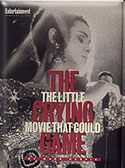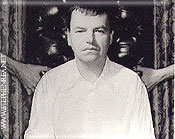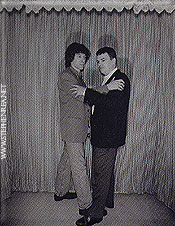 |
Silence  Go to any movie house where The Crying Game is
playing, and halfway through the film, at the moment of
its most incendiary revelation, you hear...nothing. An
isolated murmur or whisper may rise into the darkness,
but don't expect any mass gasp attacks or epidemic giggles.
Instead, the theater fills with the sound of breath being
held, of assumptions being upended, of everything you
think you've seen until then going cockeyed. "The
only thing you hear," says producer Stephen Woolley,
"is the whir of people's brains, taking it all in."
Go to any movie house where The Crying Game is
playing, and halfway through the film, at the moment of
its most incendiary revelation, you hear...nothing. An
isolated murmur or whisper may rise into the darkness,
but don't expect any mass gasp attacks or epidemic giggles.
Instead, the theater fills with the sound of breath being
held, of assumptions being upended, of everything you
think you've seen until then going cockeyed. "The
only thing you hear," says producer Stephen Woolley,
"is the whir of people's brains, taking it all in."

What they're taking in is the straight-outta-nowhere hit
of the season, a critical and popular success fueled by
a fine cast, Neil Jordan's delicately wrought script and
direction, and one pick-your-jaw-up-off-the-floor stunner
of a plot twist. With the help of a shrewd publicity campaign
by the film's distributor, Miramax, the secret at the
center of The Crying Game has become the year's
most talked-around moment in the year's most talked-about
movie. Millions of filmgoers - even the 10 percent who,
according to Woolley, correctly guess the surprise in
advance - have kept their mouths shut about Game's
carnival-ride story while trumpeting its virtues to everyone
they know.
As a result, though The Crying Game is still only
on 190 screens, it has already grossed $12.3 million,
a spectacular sum for a low-budget, Irish/British-made
art film with no big stars, an IRA terrorist for its hero,
and a central romance that's way off the track beaten
by scores of Hollywood formula films. With half a dozen
major critics' prizes to its credit and Jordan's recent
Best Director nomination from the Director's Guild of
America, a Best Picture Oscar nod is now a strong possibility
when the nominations are announced Feb. 17.
 |
In the wake of the movie's unparalleled
word of mouth, Miramax may expand its run to 800 screens
this spring, hoping to crack $25 million - a glass ceiling
for art-house movies that has not been been reached even
by such recent hits as The Players and Howard's
End. The Crying Game has also become the darling
of Hollywood, with fans ranging from Madonna ("It
was my favorite movie of last year," she says. "It
was great writing"), to CAA head Michael Ovitz, who
held a screening in Aspen over Christmas that drew Kurt
Russell, Goldie Hawn, and Barry Levinson. In L.A., the
guest list for screenings has included Julia Roberts,
Nicolas Cage, and Sean Penn, but it's even more A list
to own a promotional video of the movie - a talisman that's
as much a certification of cool as your own cameo in The
Player.
Considering that not one American (or British) studio
was willing to give 2 cents (or tuppence) to finance The
Crying Game in advance, the irony of this fairy-tale
ending is not lost on the film's 42-year-old writer-director.
An intense, saturnine Dubliner, Jordan says he likes to
make movies in which "everything you assume about
the world turns out not to be true."
 |
Those aren't the kind of stories Hollywood
embraces. "Think of all the things that would have
been done wrong in the film if Hollywood had its way,"
says Jordan, his deep-set eyes darkening into a scowl.
"They would have tried to explain away the political
background. They would have tried to soften the racial
tension. And they would have demanded that the part of
Dil (the film's mystery woman) be changed in any number
of ways. And those different, difficult elements are what
make people go see the movie."
That there's even a movie for people to see is something
of a miracle. "The first two days of shooting, I
was out there with my credit card getting money from the
bank and saying, 'Can you just hold on? Will 20 (British
pounds sterling) do?'" recalls producer Woolley.
"I was broke. I didn't let anyone on the movie know
this, of course." But as cameras rolled in 1991,
the bankruptcy of its distribution company, Palace Pictures,
was only the latest in a series of obstacles that stalled
the film for nearly 10 years.
The earliest hurdle was a simple case of writer's block.
In 1983, Jordan found himself completely stymied while
writing a three-page outline for a film he was then calling
Soldier's Wife, a melodrama about a man's relationship
with the lover of a soldier he had held captive. "I
was interested in telling the story of a man who wanted
a woman only because another man had had her - a homoerotic
obsession," Jordan says, "but I couldn't quite
finish it."
Instead, the director went on to make Mona Lisa,
a 1986 art-house hit that won him a ticket to Hollywood.
His first big-studio venture, TriStar's supernatural comedy
High Spirits, was an embittering disaster, recut
by the studio and reviled by critics. "It drove me
insane," he says, "You can't believe that this
level of interference can happen in your work." Badly
disheartened, Jordan made only one more Hollywood film,
the mild We're No Angels, before returning to Ireland
and independent moviemaking.
Soldier's Wife gathered dust until 1991, when Jordan
finally came up with the crucial twists that turned his
story in The Crying Game (a title drawn from the
1964 Dave Berry song, rerecored for the film by Boy George).
He got a commitment from Irish actor Stephen Rea, a frequent
colleague whose work was largely unknown in America, to
play the IRA soldier Fergus. Forest Whitaker (Bird) signed
on to play the film's captive, and Miranda Richardson
(Damage) took the part of Fergus' fellow IRA kidnapper.
The pivotal role of Dil was the hardest to cast. "We
combed London, " says Woolley, "We tested and
tested for that role."
Eventually, the producers discovered Jaye Davidson, a
24-year-old London fashion assistant who got word of the
audition at a party for British director Derek Jarman.
"I wanted to be as professional and realistic as
possible," says Davidson, who had no previous acting
experience. "What surprised me was how difficult
it was - much harder than it looks on TV or in the movies.
But I knew that if I wasn't coming across correctly, Neil
would tell me."
"Jaye brought a lightness and gentle nature to the
role," says Woolley. "Other performers seemed
to be exaggerated."
Woolley and Jordan drew up a modest budget for The
Crying Game - about $5 million - and in the spring
of 1991, they went looking for cash. At studio after studio,
executives read the script, smiled politely, and slammed
the door in their faces.
"There was absolutely no appetite for the film in
the script stage," says ICM president Jeff Berg,
Jordan's agent. "It was perceived as a political
thriller with a troubling and confusing romance."
Even Miramax, a company known for taking on difficult
projects, declined to put up any money in advance. "It
wasn't clear how the casting and other elements were going
to come off, " says Miramax cochairman Bob Weinstein.
"There are delicate roles that have to be deftly
managed."
"Maybe if I'd cast it with, I don't know, Mickey
Rourke or somebody, I would have gotten money," says
Jordan. "But in a recession, timidity rules."
Forced to postpone production from July to November of
1991, Woolley frantically began looking for investors.
"It was a true nightmare," says Rea. "I
knew that I wanted to do the film, but I had to turn down
a lot of other work." By the time The Crying Game
began two months of shooting in Ireland and England,
the film's entire cast and crew agreed to defer 30 percent
of their salaries until profits were recouped. "My
distribution company went bust," says Woolley, who
has produced four of Jordan's other feature films. "I
had to borrow from everywhere."
But the money came with strings attached. Unhappy with
The Crying Game's ending, investors demanded that
Jordan write a different, more optimistic final scene.
"I wrote a fake ending that I knew would make them
happy," says Jordan. "And I had to shoot it
just in order to show them that it didn't work, so I could
get permission to go back and shoot my original ending."
The unused wrap-up involved an out-of-the-blue cash windfall
and an escape to Barbados for some of the characters.
"I didn't enjoy doing (the alternative ending),"
says Rea. "And maybe that came through on film."
With it's original ending restored, The Crying Game
looked better on celuloid than it had on paper. Miramax,
which had been cool to the script, eagerly purchased distribution
rights for just over $1 million, unveiling the movie at
the Telluride Film Festival last September. "The
audience at Telluride was older and rather wealthy,"
recalls Woolley, "And The Crying Game is a
movie about people we usually demonize as terrorists and
deviants. We had no idea how the audience would react."
When the closing credits rolled, however, the filmmakers
were relieved to hear applause followed by an excited
what-the-was-that? buzz.
Faced with publicizing a movie with an unpublicizable
plot, Miramax sent a statement to reviewers asking them
to keep the story's unexpected turns a secret. The critics
cooperated when the film opened in New York and Los Angeles
over Thanksgiving weekend - but, more significantly, so
did the moviegoers. The Sanctity of the Secret soon became
a badge of good behavior among discerning viewers. "In
the first weeks of the movie," says Miramax's Weinstein,
"I went to the theater and said, 'What happens in
this movie? I heard there's a big secret.' And people
would be violent! They'd say, 'I'm not going to ruin it
for you - see it for yourself!'"
Those words are gold to a film's box office chances, so
it's no surprise that in two months at New York's strenuously
trendy Angelika Film Center, The Crying Game has
already sold a record $600,000 worth of tickets. But as
the film's release has been broadened, it has done impressively
in such markets as Atlanta, Dallas, Philadelphia, and
Minneapolis, where its $81,000 second week was an all-time
high for the Landmark's chain's Uptown Theater. "The
film has broken records for us in several cities, "
says David Swanson, Landmark's vice president of marketing.
"And in no case was its first week its biggest week.
We don't see that often. It's very strange."
Even within the movie industry, the secret - to tell
or not to tell - has become a playful hot topic. Lily
Tomlin, appearing on TV's CableACE Awards, teasingly threatened
to spill the secret on the air. (She didn't.) And at this
year's New York Film Critics Circle dinner, where Jordan's
screenplay and Richardson's performance won prizes, director
Jonathan Demme (The Silence of the Lambs)
took the podium and said with a a laugh, "I love
that even here, the secret of The Crying Game
is being honored! Is there anyone here who hasn't
seen it?"
That kind of visibility is already giving the film's astounded
performers an introduction to the fast track. Directors
and producers are wooing Rea, 50, who won this year's
National Society of Film Critics Best Actor award and
is now mirror-imaging his role by playing a hostage in
Broadway's Someone Who'll Watch Over Me. "Honestly,
I don't know that much about Hollywood, " says Rea,
who lives in Belfast. "But I guess I'm going to get
an agent." And Davidson, who "never thought
I'd be offered anything else worth doing - I didn't think
I was very good," now admits that "there are
some feelers out, some interesting things." Not to
mention a possible Academy Award nomination. "What
are the Academy Awards?" say the soft-spoken, currently
unemployed Briton. "Oh the Oscars? Well, who
wouldn't love to go?"
 |
The Crying Game's success has also
given Jordan an unlikely second go-around in Hollywood.
David Geffen has signed him to rewrite and direct the
forever-in-development screen version of Anne Rice's Interview
with the Vampire for Warner Bros.; Daniel Day-Lewis
and Brad Pitt have been mentioned to costar. And Columbia
is seeking to sign him to adapt Graham Greene's The
End of the Affair. But in some cases, says Jordan,
"the studios still won't make the films I want to
do." An "18th-century gangster film" called
Jonathan Wild" has been tough to get going,"
he says. And a script about Irish revolutionary Michael
Collins - "the best piece of writing I've ever done"
- now dwells in the shadow of a competing Collins biography
being developed by Kevin Costner. "Warner Bros. commissioned
mine nine years ago," says Jordan, "and they
keep saying, maybe next year. Even though this film is
a big hit, nothing changes."
But this time, studios may be more willing to give Jordan
room. "He has hit an emotional nerve with his movies,"
says Sam Kitt, director of production at Universal Pictures.
"And when you count Mona Lisa, you have to
say that somebody who can do it more than once has something
special to offer."
"(The movie) succeeds because it's original,"
says Brandon Tartikoff, former Paramount chairman. "We're
in a romantic age and it's a twisted love tale."
"Neil has a cohesive vision, and most movies don't,"
says Janet Yang, vice president of production at Oliver
Stone's Ixtlan Corp. "His failures - his Hollywood
films - are perfect proof that we have a lot to lose when
filmmakers are forced into the Hollywood frame of mind."
Indeed, Jordan's description of his own work would probably
get him tossed out of most pitch meetings. "The films
I make are unusual need special handling, " he says.
"They start with realistic premises and lead to seemingly
unrealistic conclusions. And I'm interested the way politics,
racial issues, and sexual issues impinge on that journey."
But that low-concept sell - what Rea calls "a very
personal, very quiet story" - is what's packing
them in right now. The Crying Game's American
success may even lead to a rerelease in Britain, where
the film performed only tepidly when it opened last October.
"Isn't it great that not only do Americans like movies
but they want to discover movies?" says Jordan,
almost abashed. "The fact that this one seems to
be taking off..." he laughs. "It's remarkable.
Unbelievable. You're a great country you know?"
